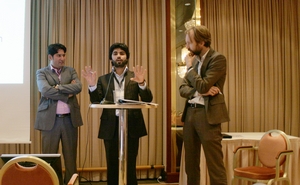Journalists fighting war lords, government and mullahs
- The Afghan authorities are two-faced; they have a democratic face to show the west, and a merciless fundamentalistic face for the people, Massood Qiam says.
 xxx  From left: Harun Najafizada, Massoud Qiam, Sigurd Falkenberg Mikkelsen. |
Najafizada works for BBC Persian Services in Afghanistan. Together with his colleague Harun Najafizada, from Tolo TV, he told the GIJC audience about his everyday life and the challenges Afghan journalists meet every day on Thursday.
- We have many challengers, amongst them the mullahs and the government. In Afghanistan, little things can bring you to the peak of death sentence. Take for instance the journalist Parvez Kambakhsh. He was sentenced to death by a religious court because he had downloaded and read what they described as “un-islamic” material. Whether he distributed anything has not been proved, but his execution has been postponed because of pressure from the west. We need that; please keep applying pressure on the government, Najafizada urged his audience Thursday.
War lords own media
In Afghanistan, there are 14 private TV stations. 7 of these are owned by war lords.
- Taliban is a great challenge for us. They want the media to cover their meetings and make articles on their press releases, basically everything, even if it’s not newsworthy, Najafizada said.
- There is a problem in Afghan media that many journalists are unprofessional and unbalanced, Massoud Qiam adds, referring to the fact that some journalists may accept bribes to avoid writing about “risky topics”.
“Freedom of speech”
The two journalists among other topics spoke about the minister of information and culture, who is amongst the officials who have spoken fondly of freedom of speech. When he thought nobody was looking, the same man described freedom of speech as a western phenomenon.
Committee to protect journalists calls Afghanistan the worst place to work as a journalist, and has registered 58 cases of violence against journalists the last year, and 9 deaths.
- They limit your access to sources, and you can receive death threats. They threat your family, force your editors to fire you, or they mysteriously kill you. The people responsible for our freedom of speech don’t believe in it, Najafizada concluded.

